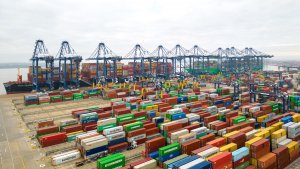Brexit's impact on international corporates is being fiercely debated, but what about freelancers in the on-demand economy?
How Will Brexit Affect The On-Demand Freelance Economy?
Brexit's impact on international corporates is being fiercely debated, but what about freelancers in the on-demand economy?

The Brexit vote has undoubtedly been a big shock to UK business, its ramifications are far reaching and the will-we-won’t-we situation that has just arisen only acts to increase the general uncertainty about what the future holds.
Yet whilst the potential effects on big corporates have been widely reported, what can freelancers and SMEs expect to experience as Brexit continues to play out? What opportunities are likely to present themselves within the on-demand freelance economy?
It seems clear that confidence amongst the 1.9million freelancers in the UK has taken a knock and, according to IPSE's Freelancer Confidence Index, Brexit has been one of the main concerns. 42% of freelancers surveyed by IPSE said the outcome of the EU referendum lowered their business performance in the third quarter of 2016.
However underlying business growth had been good in the leadup to the Brexit vote and the report suggests that freelance projects may still increase in value, with 40% of freelancers believing their day rate will increase over the next 12 months. IPSE's CEO, Chris Bryce said, "Brexit gave freelancers pause for thought, but confidence may be beginning to return in their business outlook.”
Whilst the short-term outlook may seem full of uncertainty I personally share IPSE’s optimism for the long-term future of freelancing. In fact I could see how there is even an argument that Brexit has the potential to act as a catalyst which takes the on-demand freelance economy in the UK to a whole new level.
So what is on-demand freelancing? At the moment, professional on-demand freelancing often gets lumped in with the wider description of the 'gig economy' which is all about platforms that facilitate low cost, simple tasks.
In my opinion global ‘gig’ platforms can sometimes result in a race to the bottom with incredibly low pay whereas on-demand freelancing platforms like weliketowork.com are all about professional business services where cheapest is not necessarily best.
I don’t call this the ‘gig economy’ because I see it as very different. The emphasis is on high-quality work for a fair price and hiring a professional freelancer to write a PR strategy for your company is very different to paying someone to lift share, design a logo for $20 or help with house removals.
Somebody wise once said “necessity is the mother of invention” and it could be that the demands placed on our economy by Brexit speed up the adoption of on-demand freelancing within professional business services and potentially position the UK as a global leader in this area.
As I see it, the key ingredient to the longer term optimism for freelancers is the 5.4 million small and medium sized businesses in the UK. Last year they contributed £1.6 trillion to our economy, and that grew from £1.2 trillion the previous year.
Brexit has put a lot of pressure on small business owners. Making long-term plans is difficult and the idea of employing full-time salaried staff in order to grow could seem like a big risk at the moment.
However, what I believe this uncertainty will do is create an environment where business owners look for options that allow them to grow in smaller, more manageable steps. If they can’t afford to hire a full time member of staff they can outsource projects to large communities of on-demand freelancers via easy to use online platforms and stay productive without overstretching.
It’s possible for a small business to outsource almost anything to a professional freelancer via an on-demand platform, from web development, graphic design and HR through to content production and social media management.
What I think is really exciting about this is that a few small projects can kick-start growth in an SME, which can then create opportunities to hire full-time employees where this would previously have been out of the question.
If Brexit motivates more and more small businesses owners to use freelancers via on-demand platforms it would also give them the opportunity to engage with what I call the 'hidden workforce'.
For example, highly skilled Mums, Dads and retirees who freelance in their spare time or professionals who freelance as a second source of income, basically talented people who employers can’t normally access.
Many other factors will also come into play with Brexit, for example weakness in the pound makes using freelancers in places like the USA and the Eurozone relatively more expensive and reduced access to overseas talent could compound existing UK skills shortages.
Lots of people are concerned about this but it could also be seen an opportunity for UK businesses to be more self-reliant by utilising this 'hidden workforce' of homegrown talent that they don't currently make enough use of.
Ultimately, until (if) article 50 is triggered and there is clarity around the terms of the deal moving forward it will not be clear how UK freelancers and companies will be affected.
However I believe that the most likely outcomes mean it makes sense, more now than ever, for UK businesses to make use of highly skilled on-demand freelancers who deliver good work for a fair price.
Thanks for signing up to Minutehack alerts.
Brilliant editorials heading your way soon.
Okay, Thanks!




